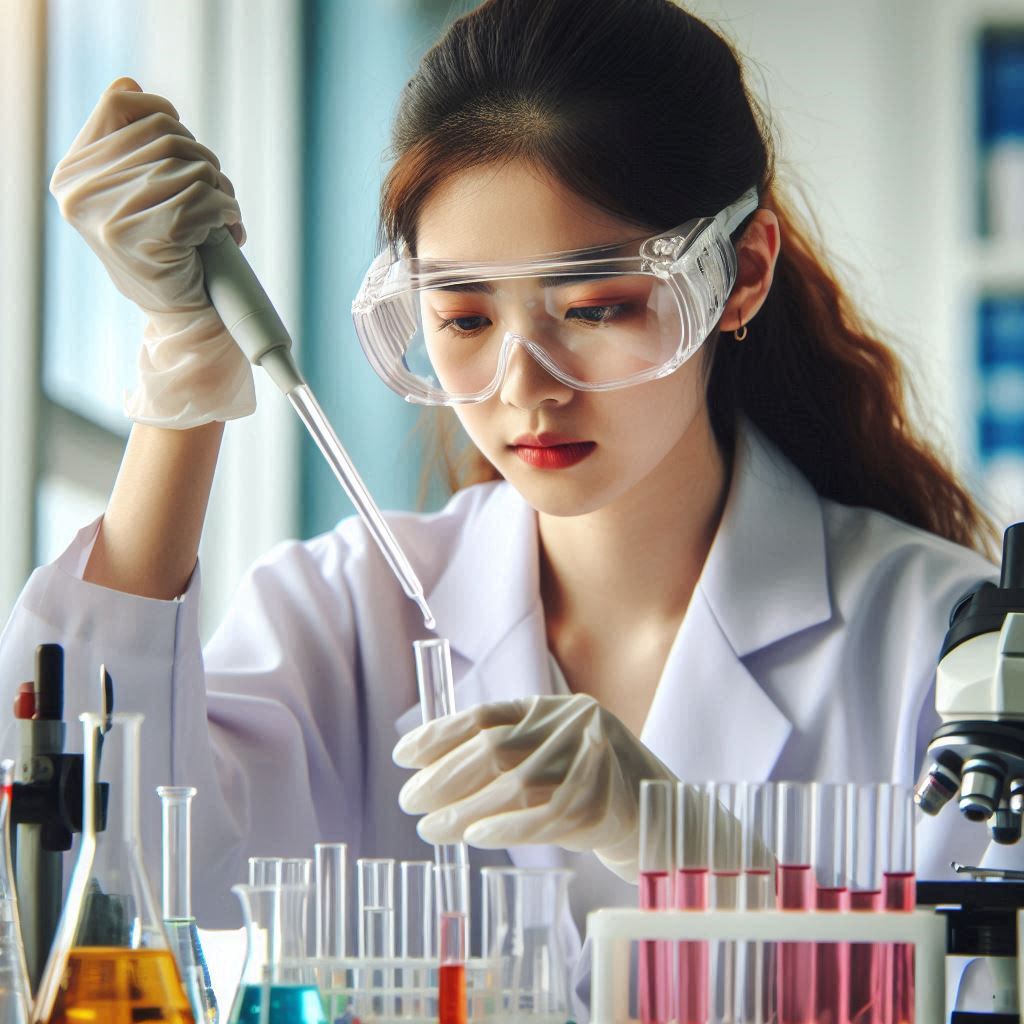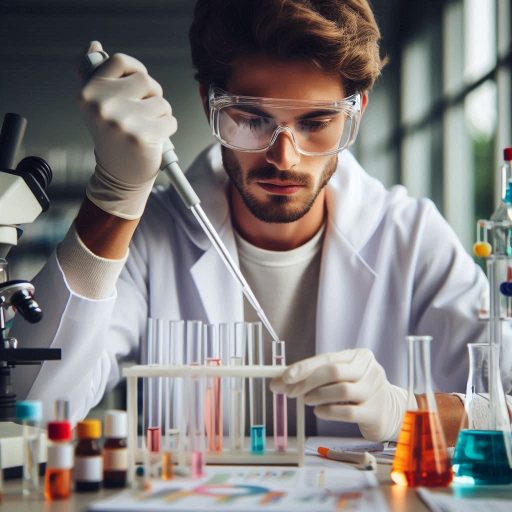Introduction
Overview of the Roles of a Laboratory Technician and Lab Technologist
Laboratory technicians and lab technologists both play critical roles in the healthcare field but differ in their responsibilities and educational backgrounds.
Technicians, who typically hold an associate degree, focus on performing routine tests, preparing samples, and maintaining lab equipment.
Their work is essential for ensuring that basic testing procedures run smoothly.
Lab technologists, on the other hand, usually have a bachelor‘s degree and are responsible for more complex tasks.
They conduct advanced tests, analyze intricate data, and oversee the quality of testing procedures.
They often supervise technicians and handle sophisticated diagnostic instruments.
Importance of These Professions in the Healthcare Industry
Both roles are vital for accurate diagnostics and patient care.
Technicians ensure that essential tests are conducted efficiently, while technologists interpret complex data and manage advanced testing processes.
Together, they support accurate medical diagnoses and effective treatment plans, contributing significantly to overall patient care.
Compare and Contrast the Two Roles
This blog post aims to compare and contrast the roles of laboratory technicians and lab technologists.
It will explore their distinct responsibilities, educational requirements, and contributions to healthcare, helping readers understand each role’s unique importance and make informed career choices in laboratory science.
Education and Training Requirements
When comparing the education and training requirements for laboratory technicians and lab technologists, several key differences emerge.
These differences impact the depth of expertise and scope of work for each profession.
Understanding these distinctions can help guide career choices and educational paths in the laboratory sciences.
Difference in educational background for laboratory technicians
Laboratory technicians typically need an associate degree in medical laboratory technology or a related field.
This degree usually takes about two years to complete.
The curriculum focuses on fundamental laboratory skills, including specimen collection, basic diagnostic tests, and operating standard lab equipment.
Some technicians might enter the field with a certificate from a vocational program.
These programs are shorter, often around one year, and emphasize practical skills essential for entry-level positions.
Lab technologists, however, generally require a bachelor’s degree in medical technology or clinical laboratory science.
This degree typically takes four years to complete.
The coursework for technologists is more comprehensive and includes advanced subjects such as microbiology, biochemistry, immunology, and molecular biology.
The extended duration and depth of study prepare technologists for more complex diagnostic tasks and higher-level responsibilities in the lab.
Certification and Licensure
Certification is a critical component for both laboratory technicians and lab technologists, though the specifics differ.
Laboratory technicians often seek certification from the American Society for Clinical Pathology (ASCP) or similar organizations.
This certification confirms their ability to perform essential laboratory procedures accurately and competently.
In many cases, employers require this certification, and it can also be a factor in career advancement.
Lab technologists also pursue certification, typically through the ASCP or other professional bodies such as the American Medical Technologists (AMT).
The certification process for technologists usually involves a more extensive examination that covers a broader range of topics and advanced laboratory techniques.
Additionally, some states have specific licensure requirements for both roles.
The licensure process often involves passing a state exam and meeting continuing education requirements to maintain certification.
Duration of Training Programs
Training programs for laboratory technicians generally last about two years.
These programs are designed to equip students with the essential skills needed for entry-level positions.
The focus is on practical, hands-on experience with laboratory equipment and techniques, providing a solid foundation for performing routine diagnostic tests.
In contrast, lab technologist programs typically span four years.
The additional time allows for a more in-depth education, including advanced coursework and extensive laboratory practice.
Students in these programs gain a broader understanding of laboratory science, preparing them for more complex analytical tasks and supervisory roles.
The educational and training requirements for laboratory technicians and lab technologists reflect their distinct roles and responsibilities.
Technicians usually complete a two-year associate degree or a certificate program, while technologists pursue a four-year bachelor’s degree.
Both professions require certification, with technologists facing more rigorous exams and potentially additional licensure requirements.
These educational paths ensure that each role is well-equipped to meet the demands of their respective responsibilities in the laboratory setting.
Read: Top CAD Software for Aspiring CAD Technicians
Job Responsibilities
Specific Duties of a Laboratory Technician in a Healthcare Setting
In a healthcare setting, laboratory technicians handle essential tasks that ensure the smooth operation of laboratory processes.
Their primary duties include preparing samples for analysis and operating various laboratory equipment.
Technicians perform routine tests and document results meticulously.
They maintain and calibrate equipment to ensure accuracy and reliability.
Additionally, technicians are responsible for collecting specimens from patients, such as blood or urine.
They also clean and sterilize laboratory instruments to prevent contamination.
Responsibilities of a Lab Technologist and How They Differ from a Technician
Lab technologists have a more advanced role compared to technicians.
They perform complex diagnostic tests and analyze results with greater depth.
Technologists often develop and validate new testing procedures, which requires a higher level of expertise.
They interpret intricate test results and provide detailed reports to healthcare professionals.
Additionally, technologists oversee laboratory operations, including managing technicians and ensuring compliance with regulations.
They are involved in troubleshooting advanced problems and optimizing lab processes, which sets their role apart from that of a technician.
Hands-On Tasks Performed by Each Role in the Laboratory
The hands-on tasks of laboratory technicians and lab technologists reflect their differing responsibilities.
Technicians focus on routine sample processing and equipment maintenance.
They follow established protocols and standard operating procedures for accuracy.
Technicians handle the daily operational tasks of the lab and ensure that tests are performed correctly.
They play a crucial role in maintaining the laboratory‘s efficiency.
Lab technologists engage in more complex tasks, including operating advanced machinery and performing sophisticated tests.
They analyze and interpret detailed data, which requires a higher level of knowledge.
Technologists often develop new testing methods and solve intricate problems that arise in the lab.
Their role involves a significant degree of innovation and problem-solving, distinguishing them from technicians.
In summary, laboratory technicians and lab technologists each have distinct responsibilities within a healthcare setting.
Technicians manage routine tasks and sample handling, while technologists focus on advanced analysis and procedure development.
Understanding these roles highlights their unique contributions to laboratory operations and patient care.
Read: How to Become a CAD Technician: Step-by-Step Guide
Scope of Practice
Limitations and Scope of Practice for a Laboratory Technician
Laboratory technicians have a well-defined scope of practice focused on routine tasks and sample handling.
Their duties include preparing samples, operating standard laboratory equipment, and performing basic tests.
Technicians follow established protocols and standard operating procedures, which limits their role to predefined tasks.
They typically do not engage in the development or validation of new testing methods.
Their responsibilities are critical for day-to-day operations but are generally confined to maintaining and processing samples rather than conducting advanced analyses.
Expanded Roles and Responsibilities of Lab Technologists
Lab technologists have a broader and more complex scope of practice compared to technicians.
They are responsible for performing advanced diagnostic tests and interpreting detailed results.
Technologists play a key role in developing and validating new testing procedures, which requires a higher level of expertise.
They manage laboratory operations, including overseeing technicians and ensuring compliance with regulatory standards.
Their role often involves troubleshooting complex issues and optimizing lab processes, which expands their responsibilities beyond routine tasks.
Ability to Perform More Complex Tests and Procedures as a Technologist
Lab technologists have the capability to perform more complex tests and procedures due to their advanced training and expertise.
They operate sophisticated machinery and conduct intricate analyses that require a deeper understanding of diagnostic techniques.
Technologists are involved in interpreting complex data and providing detailed reports to healthcare professionals.
Their ability to develop new testing methods and solve advanced problems distinguishes their role from that of technicians.
This expanded scope allows technologists to contribute to innovative practices and improve diagnostic accuracy in the laboratory.
In summary, while laboratory technicians focus on routine tasks within a specific scope of practice, lab technologists have a broader and more complex range of responsibilities.
Technologists perform advanced tests, manage lab operations, and contribute to the development of new methods, showcasing their expanded role in healthcare laboratories.
Read: Surveying and Mapping Technician Internships: A Guide

Salary and Career Growth
Average Salary Range for Laboratory Technicians Compared to Lab Technologists
The average salary for laboratory technicians generally ranges from $40,000 to $60,000 annually.
Their earnings depend on factors such as experience, location, and specialization.
In contrast, lab technologists tend to earn more due to their advanced training and responsibilities.
The average salary for lab technologists typically ranges from $55,000 to $75,000 per year.
This difference reflects the increased complexity and expertise required for technologists.
Opportunities for Career Advancement for Both Roles
Laboratory technicians have opportunities for career advancement by gaining additional certifications or specializing in specific areas.
They can move into supervisory roles or transition into positions such as laboratory managers with further education.
Technicians may also pursue advanced degrees to qualify for higher-level roles in the field.
Lab technologists, on the other hand, have broader career growth potential.
They can advance to senior technologist positions, become laboratory managers, or even move into specialized areas such as research and development.
Continued education and specialization can lead to leadership roles and higher earning potential.
Factors That May Impact Salary and Career Growth in Each Profession
Several factors influence salary and career growth for both laboratory technicians and lab technologists.
Experience plays a significant role, with more experienced professionals generally earning higher salaries.
Location also affects earnings, as salaries can vary based on geographic area and cost of living.
Specialization and advanced certifications can boost both salary and career advancement opportunities.
Additionally, the demand for skilled professionals and the presence of new technologies in the field can impact growth potential and job stability.
Technologists often have more opportunities for career advancement due to their advanced skills and broader scope of practice.
In summary, while laboratory technicians and lab technologists both play crucial roles in healthcare, their salary ranges and career growth opportunities differ.
Technologists typically earn more and have broader career advancement prospects, reflecting their advanced expertise and responsibilities.
Factors such as experience, location, and specialization significantly impact salary and career growth in both professions.
Read: Impact of Drones on Surveying and Mapping
Transform Your Career Today
Unlock a personalized career strategy that drives real results. Get tailored advice and a roadmap designed just for you.
Start NowWork Environment
Typical Work Settings for Laboratory Technicians and Lab Technologists
Laboratory technicians and lab technologists typically work in healthcare settings such as hospitals, diagnostic laboratories, and medical clinics.
Technicians often work in settings where they handle routine tests and sample processing.
Their environment includes clinical laboratories with standard equipment and procedures.
Lab technologists, while also working in these settings, might be found in specialized labs or research facilities where they perform more complex analyses.
They may also work in academic institutions or pharmaceutical companies, focusing on advanced diagnostic procedures and research.
Collaborative Nature of Work in a Laboratory Setting
Both laboratory technicians and lab technologists work closely with other healthcare professionals in a laboratory setting.
Technicians collaborate with technologists, pathologists, and physicians to ensure accurate test results and efficient lab operations.
They often assist in preparing samples and providing data for further analysis.
Lab technologists work in a more integrated role, often leading teams and coordinating with other specialists to develop and validate testing methods.
They may also work with research teams or participate in interdisciplinary projects, contributing to a collaborative environment focused on innovation and accuracy.
Differences in Working Conditions and Requirements for Each Role
The working conditions and requirements for laboratory technicians and lab technologists differ based on their roles.
Technicians generally have more routine tasks and may work standard shifts, including evenings or weekends, depending on the lab’s operational hours.
Their role involves more direct sample handling and equipment maintenance, which can involve exposure to biological samples and chemicals.
Technologists, on the other hand, often work in settings that require advanced equipment and may involve more variable hours or on-call duties, especially in research or specialized labs.
They handle more complex procedures and might work in environments with higher demands for precision and innovation.
In summary, while both laboratory technicians and lab technologists work in healthcare and research settings, their roles and working conditions vary.
Technicians focus on routine tasks and sample processing in clinical environments, while technologists engage in advanced analyses and research in specialized settings.
Both roles require collaboration but differ in their specific responsibilities and working conditions.
Gain More Insights: Robotics Engineering and Artificial Intelligence Synergy
Gain More Insights: Day in the Life of an Environmental Technician
Equipment and Technology
Equipment and Tools Commonly Used by Laboratory Technicians
Laboratory technicians use a range of standard equipment and tools in their daily tasks.
Commonly used items include microscopes for examining specimens, centrifuges for separating substances, and pipettes for accurate liquid measurement.
They also operate analyzers for routine blood tests and basic diagnostic procedures.
Technicians work with automated machines for sample processing and storage.
They use centrifuges to separate blood components and spectrophotometers for measuring light absorption.
Additionally, they handle various chemical reagents and maintain basic laboratory glassware and tools.
Advanced Technology and Instrumentation Utilized by Lab Technologists
Lab technologists work with more advanced technology and instrumentation due to their specialized roles.
They use sophisticated equipment like high-performance liquid chromatographs (HPLC) for separating complex mixtures.
Mass spectrometers analyze the molecular composition of samples, and PCR machines perform genetic testing and amplification.
Technologists operate advanced imaging systems, such as electron microscopes, for detailed structural analysis.
They may also work with automated analyzers that perform a variety of complex tests simultaneously.
These advanced tools require a deeper understanding of both the equipment and the analytical techniques used.
Training and Proficiency Required to Operate Specialized Equipment
Operating specialized equipment requires significant training and proficiency.
Laboratory technicians typically receive training in the use of standard lab equipment and safety protocols.
Their training focuses on ensuring accurate and reliable results from routine tests.
Lab technologists, however, require more extensive education and hands-on experience with advanced technology.
They undergo specialized training in operating complex instrumentation and interpreting detailed data.
Technologists must stay current with technological advancements and continuously develop their skills to handle evolving equipment.
Proficiency in advanced technology often involves obtaining additional certifications and participating in ongoing professional development.
In summary, laboratory technicians and lab technologists use different levels of equipment and technology based on their roles.
Technicians work with standard tools for routine tasks, while technologists handle advanced instrumentation for complex analyses.
Both roles require specific training, but technologists need more extensive proficiency in operating specialized equipment.
Professional Organizations and Networking
Benefits of Joining Professional Organizations for Laboratory Technicians
Joining professional organizations offers significant benefits for laboratory technicians.
These organizations provide access to valuable resources such as industry journals, educational materials, and professional development opportunities.
Membership often includes access to certification programs and continuing education courses, which can enhance skills and career prospects.
Technicians can also benefit from networking opportunities with peers and mentors, which can lead to job referrals and professional support.
Additionally, being part of a professional organization helps technicians stay informed about industry standards and best practices, ensuring they maintain high-quality work and adhere to current regulations.
Networking Opportunities Available for Lab Technologists
Lab technologists can leverage professional organizations for extensive networking opportunities.
These organizations often host conferences, workshops, and seminars where technologists can connect with other professionals in their field.
Networking events provide a platform to exchange knowledge, collaborate on research projects, and discuss industry trends.
Technologists can join specialized groups within these organizations, focusing on areas such as advanced diagnostics or research technologies.
Engaging in these networks can lead to career advancement opportunities, collaborative projects, and exposure to cutting-edge developments in the field.
Importance of Staying Current with Industry Trends and Advancements in Healthcare Technology
Staying current with industry trends and advancements is crucial for both laboratory technicians and lab technologists.
The healthcare field is rapidly evolving with new technologies and diagnostic methods.
For technicians, understanding these advancements ensures they use the latest tools and techniques accurately.
For technologists, staying updated is essential for maintaining proficiency with advanced instrumentation and contributing to innovative practices.
Continuous learning helps professionals remain competitive, improve job performance, and adapt to changes in laboratory practices.
Engaging with professional organizations and attending industry events are effective ways to keep up with these developments and integrate new knowledge into daily work.
In summary, professional organizations provide valuable resources and networking opportunities for both laboratory technicians and lab technologists.
Joining these organizations offers benefits such as access to educational materials and career advancement opportunities.
Staying current with industry trends and advancements is vital for maintaining expertise and adapting to new technologies in healthcare.
Conclusion
The Differences Between a Laboratory Technician and Lab Technologist
Laboratory technicians and lab technologists differ mainly in their education and scope of work.
Technicians typically have an associate degree and focus on performing routine tests and maintaining equipment.
Lab technologists, holding a bachelor‘s degree, handle more complex testing, data analysis, and quality control.
Technologists often supervise technicians and manage intricate procedures.
The Unique Roles Each Profession Plays in the Healthcare Field
Technicians are crucial for daily operations, ensuring accurate test results and efficient lab function.
They carry out the essential tasks that support diagnostic accuracy.
Lab technologists play a critical role in interpreting complex test results, operating advanced instruments, and contributing to research and development.
They provide insights that are vital for diagnosis and treatment planning.
Encouragement for Further Research or Exploration of Career Options in the Laboratory Science Field
For those interested in laboratory science, exploring educational pathways and job roles is essential.
Both careers offer rewarding opportunities and contribute significantly to healthcare.
Investigate further to understand which role aligns with your skills and career goals, and make an informed choice about your future in this field.




